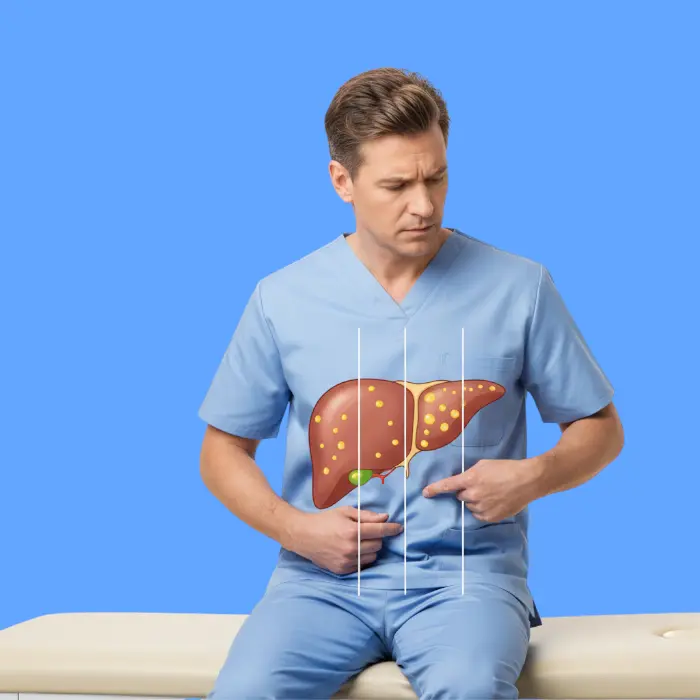what is fatty liver disease?
Fatty liver is a condition where fat accumulates inside liver cells at levels higher than normal, which may affect its vital functions over time.
In early stages, there may be no clear symptoms, but continued fat buildup can lead to inflammation or liver fibrosis. The condition is medically known as Fatty Liver Disease, and it is classified into two types: alcoholic and non-alcoholic, with the latter being more common in our region.
what are the causes of fatty liver disease?
There are several causes that lead to fat accumulation in the liver, often linked to lifestyle or certain health conditions, including:
- Obesity and excessive weight gain.
- Insulin resistance or type 2 diabetes.
- High levels of triglycerides or cholesterol in the blood.
- Heavy alcohol consumption (in alcoholic fatty liver).
- Poor nutrition or rapid weight loss.
- Use of certain medications like corticosteroids or heart drugs.
- Chronic diseases such as viral hepatitis.
- Genetic factors and family history of liver disease.
what are the common symptoms of fatty liver?

Often, there are no clear symptoms in the early stages, but as the condition progresses, some signs may appear, including:
- Persistent fatigue and tiredness.
- Pain or discomfort in the upper right abdomen.
- Loss of appetite or feeling full quickly.
- Unexplained weight loss.
- Yellowing of the skin or eyes (jaundice).
- Swelling in the abdomen or legs.
- Dark-colored urine.
- Itchy skin.
when should you see a doctor?
Although fatty liver may go unnoticed, there are situations that require immediate medical attention, including:
- Persistent fatigue or tiredness without a clear cause.
- Recurrent pain in the liver area.
- Appearance of jaundice on the skin or eyes.
- Rapid and unexplained weight loss.
- Changes in urine or stool color.
- Swelling in the abdomen or feet.
- Abnormal liver function test results.
- Family history of liver diseases.
what are the treatment options for fatty liver?
There is no specific medication for fatty liver, but several effective steps can help improve the condition, including:
- Gradual and safe weight loss.
- Following a healthy diet low in fats and sugars.
- Regular physical activity like walking or swimming.
- Managing diabetes and blood pressure.
- Reducing medications that affect the liver.
- Taking vitamin E supplements in some cases under medical supervision.
- Regular follow-up with a doctor to monitor progress.
can fatty liver be cured?
Yes, in many cases, fatty liver can be reversed, especially if detected early and lifestyle changes are adopted. Losing 5 to 10% of body weight can significantly reduce fat and improve liver function.
However, in advanced cases that progress to fibrosis or chronic inflammation, treatment becomes more complex and requires close monitoring and a long-term care plan.
what are the prevention tips for fatty liver?
Preventing fatty liver starts with a healthy lifestyle, and there are simple yet effective steps to follow, including:
- Maintaining a healthy weight and avoiding obesity.
- Eating a balanced diet rich in vegetables and low in fats.
- Reducing sugar and soft drink consumption.
- Exercising regularly for at least 30 minutes daily.
- Drinking enough water every day.
- Undergoing regular liver function tests.
- Avoiding liver-damaging medications without medical advice.
what are the possible complications of fatty liver?
If not treated in time, fatty liver can progress and lead to serious complications, including:
- Non-alcoholic steatohepatitis (NASH).
- Liver fibrosis and loss of function.
- Acute liver failure.
- Increased risk of liver cancer.
- Blood clotting problems.
- Fluid accumulation in the abdomen (ascites).
- Digestive system disorders.
- Weakened immunity and higher infection risk.
frequently asked questions about fatty liver
Is fatty liver a serious disease?
Not always, but it can become serious if left untreated.
Can fatty liver go away?
Yes, with lifestyle changes and proper treatment.
Does fatty liver cause pain?
Sometimes, especially in the upper right abdomen.
Does fatty liver affect weight?
It is usually associated with weight gain, not weight loss.
article summary
Fatty liver is a common condition that may go unnoticed but can develop into a serious health issue if left untreated, Prevention starts with a healthy lifestyle.
Recovery is very possible if medical advice is followed, Don't hesitate to consult a doctor if you notice unusual symptoms early detection is key to effective treatment.